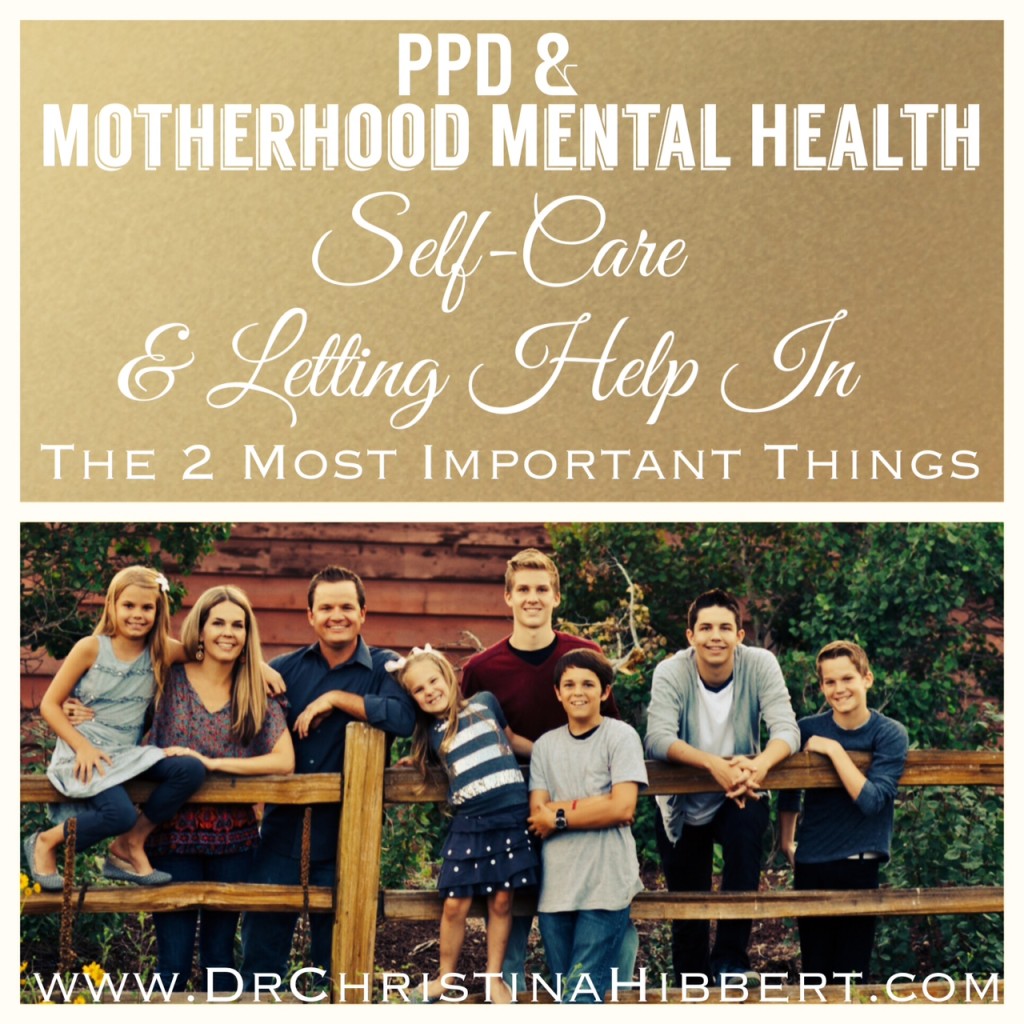
06 May PPD & Motherhood Mental Health: Self-Care & Letting Help In–The 2 Most Important Things (PSI Blog Hop 2014)
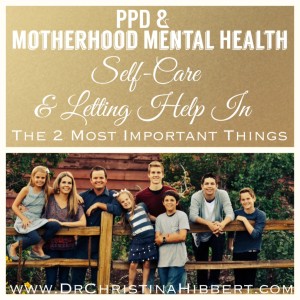 It wasn’t until I first became a mother–with a beautiful baby boy I dearly loved, yet still struggling through postpartum depression–that I realized how hard it was to practice self-care and let others help me. I thought I could—and should—do it all on my own. It was my downfall, making my depression worse. I didn’t realize how much sleep deprivation messed with my emotions. I didn’t yet understand how asking for and receiving help would be one of the most important components of self-care for me. I didn’t yet know it is one of the most important components of self-care for everyone.
It wasn’t until I first became a mother–with a beautiful baby boy I dearly loved, yet still struggling through postpartum depression–that I realized how hard it was to practice self-care and let others help me. I thought I could—and should—do it all on my own. It was my downfall, making my depression worse. I didn’t realize how much sleep deprivation messed with my emotions. I didn’t yet understand how asking for and receiving help would be one of the most important components of self-care for me. I didn’t yet know it is one of the most important components of self-care for everyone.
My fourth postpartum depression (PPD) episode was unlike the first three. So much more intense. So much more complex. My sister and brother-in-law had recently died and we had inherited our two nephews only 4 weeks to the day that our fourth baby was born. We had three kids, and then we had six.
But, I had grown over the years as a mother. I had become a clinical psychologist specializing in maternal mental health and perinatal mood disorders. I had founded The Arizona Postpartum Wellness Coalition to help other mothers and families. I had taught courses and given speeches and written articles on PPD and the Baby Blues, and I knew, 100%, how badly I needed to take care of myself and let help in.
Because this fourth postpartum experience was such a complex and challenging time, I immediately set up all my resources. I scheduled counseling sessions—for me and my husband, for our nephews, then 6 and 10, and for our two other sons, then 8 and 11. I let people do laundry for me, take my 4 year-old daughter for play dates, bring in meals, and even help me paint the nursery and prepare my home for my two new sons.
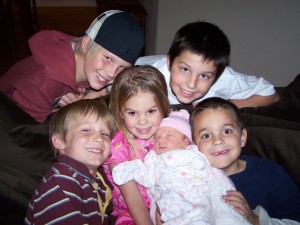
My children, first meeting their new little sister. 2007
After a few months though, when grief hit hard, I started to feel like I didn’t want to burden others. I didn’t want them to have to be around me because I felt so negative inside. I didn’t want to complain or whine or be crying all the time. And, if I’m being honest, I really felt like no one could understand what I was going through. How could they? It was so messy and raw and painful on so many levels. I felt weaker than ever before and isolated myself. I got quiet.
As I wrote, in my memoir, This is How We Grow, of that time, “I…know I haven’t invited anyone in. I take responsibility for that. I let myself seem ‘fine’ when I’m in public. I am ‘fine’ when I’m in public. That doesn’t mean I don’t have my hard times at home, or even that ‘fine’ is good enough. I wish others would notice the redness of my eyes, the dark circles around them, my sighing, the energy it takes to smile.” (p. 161)
Since my memoir came out last November, several close friends have said, after reading it, “I feel so badly, I never knew how much you were suffering.”
“I didn’t let people in,” I’ve replied. “There was no way you could have known.”
Luckily, I let my husband in. And I let my psychologist in. And I let my inner psychologist weigh in and remind me of the coping skills I’d already developed. Luckily, I at least did that much, and it was enough to get me out of the darkest days and into other help, like an antidepressant, friends, family, and writing my story.
We Mustn’t Get Quiet
But, one week ago yesterday, my dear friend lost her life as a result of mental illness. Her three children have been best friends with my children for ten years. She was their “second mom,” like I have been to her kids. It is an incomprehensible loss for her husband and children. It is a devastating loss for my children, for me, and for our entire community.
She had been trying to work on self-care, though I knew, like so many other mothers, it didn’t come naturally to her. She had been setting up and trying to utilize her support network. Outwardly, she had been doing those things that seemed right and good and helpful. But I can see now, despite all her efforts with self-care, she didn’t know how to do the one most important thing: let all that help in.
Self-Care is Crucial
How many other mothers, and children, and fathers, and families have to suffer, or even die, before we get it—that self-care isn’t about excess and dawdling and bon-bons on the couch watching soap operas. Self-care is a necessity. It’s about life, and health, and joy; it’s also about preventing despair, isolation, and death. At its core, self-care is about letting help in.
How can we help moms in need?
After a friend of mine heard of our tragic loss last week, she said to me, tears streaming down her face, “There have to be so many others out there who are suffering alone and won’t—or don’t know how—to let people in. What can we do?”
This question has been on my mind all week. What can we do? The following four things are, to me, the most important. If we can do these four things, we can stop the suffering, be there for each other, and keep our mothers safe, healthy, and strong so they can do what they do best—love and nurture their children.
1) Learn about and practice self-care. Learn to let help in. We must all learn how to take better care of ourselves. We must talk about, and teach, and encourage letting others help us, too.  “In our darkest times it is easy to feel better off alone and isolate. Our suffering is personal, and no one shares it in the same way, so why even bother? But, I can tell you–we do need others, whether we feel like it or not…Making islands of ourselves only causes more pain.” (This Is How We Grow, p. 153)
“In our darkest times it is easy to feel better off alone and isolate. Our suffering is personal, and no one shares it in the same way, so why even bother? But, I can tell you–we do need others, whether we feel like it or not…Making islands of ourselves only causes more pain.” (This Is How We Grow, p. 153)
This is especially important for pregnant and postpartum mothers, and for mothers going through stressful circumstances or dealing with mental health concerns. But it’s equally as important for all mothers and women—because we are the nurturers of families and communities. It’s also important that we educate our children and teens and young adults about self-care, that we model it for them so they may learn to see self-care as an essential part of a healthy life.
2) See others’ needs. It’s hard to see others’ needs if they don’t let you in, but one thing I know for sure is we must use our gut, not just our natural eyes. If you feel something’s not quite right, please say something or do something. Yes, it’s okay to ask a mother if she is struggling. Yes, it’s okay to tell her she seems sad and ask what you can do. We must ask and talk about it, for it sends the message that none of us is alone. It reminds us we have a friend, a hand held out in the dark. I often say, “I’d rather say something and be wrong than not say something and wish I would have.” (Read “3 Messages Every Mom Needs to Hear.”)
3) Offer support now. If you have the impression to send a text or post a quote on her Facebook page, do it. If you’re driving by and feel you should stop, please do. You might talk yourself out of it: “She’s busy.” “I don’t want to intrude.” But you’re not intruding, and even if she’s busy, she’ll at least know you care. As I write in This is How We Grow, “How do we connect? We listen. We hear. We respond. We feel. We reach out and ask, ‘How are you?’ and wait for the honest answer. Then, we reach out again. And again. We say, ‘I’m so sorry. My heart is breaking with you.’ We look past our discomfort, or we say it out loud, ‘I don’t know what to say or do. I just want to be here for you.’ We are willing to be in that space of our own discomfort or pain, because we know it’s not about us. It’s about loving the one we love…Strength and healing are in connection.” (p. 287)
4) Stick with her for the long haul. Pregnancy and postpartum depression/anxiety, and maternal mental illness, are not over in a week or a month. Neither are most of the great stresses of motherhood. Continue to ask how she’s doing. Check in regularly. Listen with your heart and not just your head. Keep doing it for as long as it takes to help her be well again.
Bottom line…
“We need connection to survive. As poet Mark Nepo writes, ‘The question to put to our daily lives, then, is this: In love, in friendship, in seeking to learn and grow, in trying to understand ourselves…When pressed by life, do I bridge or isolate? Do I reconnect the web of life and listen to its wisdom? Or do I make an island of every confusion as I try to solve its pain?'” (This is How We Grow, p. 153)
May we form a great, strong web–a net of connection and support, so when one of our sisters, friends, mothers, tribe falls, we may catch her. One voice. One hug. One love-filled, supportive, mom-to-mom moment at a time. Together, we are strong.
~Written in loving memory of Jody McDaniel.

My family, today. 2014
Join the PSI Blog Hop Here
Read this post for guidelines, then link up, below.
(Note: Posts that do not follow the guidelines will be removed by the editors)
If you need immediate help, please call the National Suicide Hotline at 1-800-273-TALK (8255)
If you are looking for local pregnancy or postpartum support and resources in your area, please call or email us:
Postpartum Support International Warmline (English & Spanish)
1-800-944-4PPD (4773)
support@postpartum.net
Please share your thoughts by leaving a comment, below. What have you found crucial to postpartum and maternal mental health recovery? What suggestions do you have for how we can better help moms in need? Are you willing and ready to join together and form this net of support and love?
Be sure to check out Dr. Hibbert’s Amazon Bestseller, This is How We Grow–
available now on Amazon.com.
**This is How We Grow Charity Fundraiser**
All proceeds from sales of This is How We Grow during the month of May 2014 will be donated to The McDaniel Family Fund, in honor of Maternal Mental Health Awareness Month and in memory of my dear friend, Jody, who lost her life last week.
Read the fundraiser post here.
FREE. Online. Growth. What more could you ask for?
You may manage your subscription options from your profile.
Let’s Connect…
“Like” my Facebook pages (Dr. Christina Hibbert; This Is How We Grow) and follow me on Twitter,Pinterest, & Instagram!
Related Articles/Posts:
Link Up! PSI Blog Hop 2104 Invitation: Maternal Mental Health Recovery & Coping
16 Things I’d Like My Postpartum Self to Know, 16 Years & 6 Kids Later (PSI Blog Hop)
Mom Mental Health (& Happiness): The Importance of Alone Time
Mom Mental Health: HOW to Get Alone Time (25+ Strategies) (& video)
Mother’s Day & “Mommy Fails”: 3 Messages All Moms Need to Hear
Discovering Self-Worth: Why is it So Hard to Love Ourselves?
How to Feel Self-Worth: “The Pyramid of Self-Worth” (& video)
Learning Self-Love: 5 Tricks for Treating Yourself More Kindly
“Perfect?” or “Fake?” 8 Truths about Perfectionism, & 8 Truths to Cure It
Beyond Depression: Understanding Pregnancy/Postpartum OCD (Part 1)
Beyond Depression: Postpartum OCD Treatment (Part 3) (& video)
Pregnancy & Postpartum Emotional Health
Postpartum Depression Treatment
Postpartum Depression Treatment: For Dads & Partners
Postpartum Depression Treatment: For Couples
Postpartum Depression Treatment: Sleep
Postpartum Depression & Men: The Facts on Paternal Postnatal Depression
Pregnancy & Postpartum Mood & Anxiety Disorders: Are Women of Advanced Maternal Age at Higher Risk?
In Praise of Fathers: 10 Research-Based Ways Dads Impact Kids for the Better
5 Reasons Self-Esteem is a Myth
Womens’ Emotions & Hormones– Series
Achieving Balance–Why You’ve Got it Wrong, & How to Get it Right
Pregnancy & Postpartum Loss, Grief, & Family Healing (Part 1)
How to Cope with and Treat Perinatal Loss & Grief (Part 2)
Moving Beyond Shame: The Ultimate Power of Support & Time (PSI Blog Hop 2013)


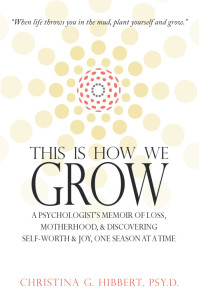
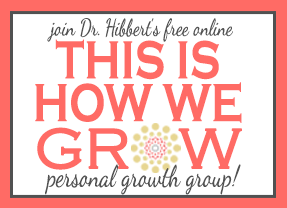

Hi Christina! I wanted to share how much I loved your book, This is How We Grow.
I recommend it as a resource to moms who are afraid to take medication. You drew form many fields and resources for your healing, and medication was just one of those tools. You used it appropriately and also other venues such as counseling and spiritual support. Here’s a link to my review on BirthTouch. Much love to you! http://birthtouch.com/2013/12/interview-and-book-review-this-is-how-we-grow-by-christina-g-hibbert-psy-d/
Thank you Kathy–for the comment, and especially for reviewing my book on your fabulous website. It is an honor, and I am grateful for your support. Love back to you! xo
Thankyou from my heart,
Much of your words ring true to me over all of your different material of life.
Your website is now my go too once the house is quiet .. your words are read in
“my alone time” as rare as they are.
You are such a bright light .. thankyou for shining for others whom maybe alittle dim lost in the chaos of new life an new self.
Take care my sister.
Many blessings x
What a kind thing to say! I’m so grateful this helps. And what a beautiful compliment to read my words during your precious alone time. I do know how sacred that time can be. Blessings to you too!